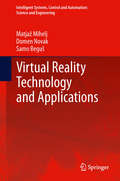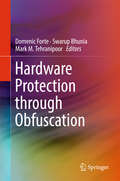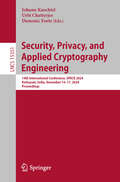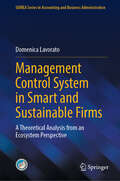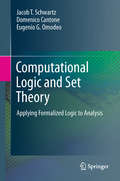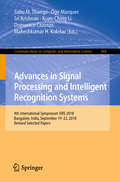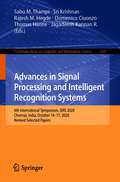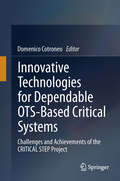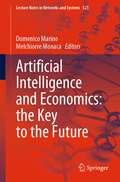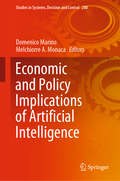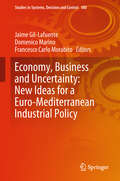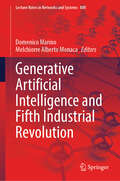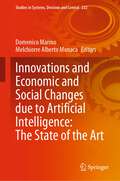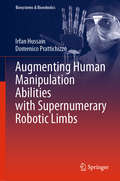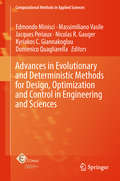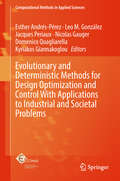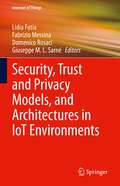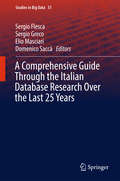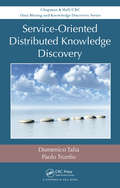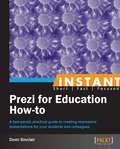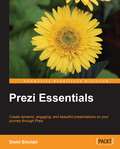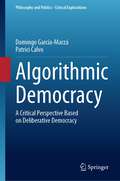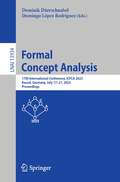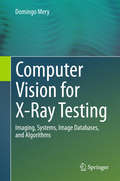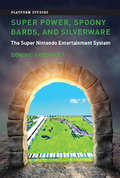- Table View
- List View
Virtual Reality Technology and Applications
by Matjaž Mihelj Domen Novak Samo BegusAs virtual reality expands from the imaginary worlds of science fiction and pervades every corner of everyday life, it is becoming increasingly important for students and professionals alike to understand the diverse aspects of this technology. This book aims to provide a comprehensive guide to the theoretical and practical elements of virtual reality, from the mathematical and technological foundations of virtual worlds to the human factors and the applications that enrich our lives: in the fields of medicine, entertainment, education and others. After providing a brief introduction to the topic, the book describes the kinematic and dynamic mathematical models of virtual worlds. It explores the many ways a computer can track and interpret human movement, then progresses through the modalities that make up a virtual world: visual, acoustic and haptic. It explores the interaction between the actual and virtual environments, as well as design principles of the latter. The book closes with an examination of different applications, focusing on augmented reality as a special case. Though the content is primarily VR-related, it is also relevant for many other fields.
Hardware Protection through Obfuscation
by Swarup Bhunia Domenic Forte Mark M. TehranipoorThis book introduces readers to various threats faced during design and fabrication by today's integrated circuits (ICs) and systems. The authors discuss key issues, including illegal manufacturing of ICs or "IC Overproduction," insertion of malicious circuits, referred as "Hardware Trojans", which cause in-field chip/system malfunction, and reverse engineering and piracy of hardware intellectual property (IP). The authors provide a timely discussion of these threats, along with techniques for IC protection based on hardware obfuscation, which makes reverse-engineering an IC design infeasible for adversaries and untrusted parties with any reasonable amount of resources. This exhaustive study includes a review of the hardware obfuscation methods developed at each level of abstraction (RTL, gate, and layout) for conventional IC manufacturing, new forms of obfuscation for emerging integration strategies (split manufacturing, 2. 5D ICs, and 3D ICs), and on-chip infrastructure needed for secure exchange of obfuscation keys- arguably the most critical element of hardware obfuscation.
Security, Privacy, and Applied Cryptography Engineering: 14th International Conference, SPACE 2024, Kottayam, India, December 14–17, 2024, Proceedings (Lecture Notes in Computer Science #15351)
by Domenic Forte Johann Knechtel Urbi ChatterjeeThis book constitutes the refereed proceedings of the 14th International Conference on Security, Privacy, and Applied Cryptography Engineering, SPACE 2024, held in Kottayam, India, during December 14–17, 2024. The 8 full papers, 10 short papers and 1 invited paper included in this book were carefully reviewed and selected from 43 submissions. They were organized in topical sections as follows: security, privacy, applied cryptographic engineering, integration of machine learning techniques, reflecting the growing prominence of this approach in contemporary research on security and cryptography, hardware security, the exploration of post-quantum cryptography, and the development of efficient implementations for emerging cryptographic primitives.
Management Control System in Smart and Sustainable Firms: A Theoretical Analysis from an Ecosystem Perspective (SIDREA Series in Accounting and Business Administration)
by Domenica LavoratoIn today's competitive environment, smart technologies are increasingly recognized as key enablers of corporate sustainability. In this new context, corporate management control systems integrate with the issues of smart technologies, sustainability and inter- and intra-organizational collaboration as the driving elements of the firm of the future. This book proposes a management control framework for today's firms. It investigates the effectiveness of traditional management control systems in today’s competitive environment and identifies potential limitations that may hinder their ability to effectively monitor modern organizations. Furthermore, the book explores whether these systems can be improved with complementary tools or if entirely new mechanisms are required. The book argues the need to adopt a new approach to control and a different lens for evaluating the activity of guiding the achievement of corporate objectives, paving the way for the conceptualization of a new management control system.
Computational Logic and Set Theory: Applying Formalized Logic to Analysis (Texts in Computer Science)
by Martin Davis Domenico Cantone Jacob T. Schwartz Eugenio G. OmodeoThis must-read text presents the pioneering work of the late Professor Jacob (Jack) T. Schwartz on computational logic and set theory and its application to proof verification techniques, culminating in the ÆtnaNova system, a prototype computer program designed to verify the correctness of mathematical proofs presented in the language of set theory. Topics and features: describes in depth how a specific first-order theory can be exploited to model and carry out reasoning in branches of computer science and mathematics; presents an unique system for automated proof verification in large-scale software systems; integrates important proof-engineering issues, reflecting the goals of large-scale verifiers; includes an appendix showing formalized proofs of ordinals, of various properties of the transitive closure operation, of finite and transfinite induction principles, and of Zorn's lemma.
Advances in Signal Processing and Intelligent Recognition Systems: 4th International Symposium SIRS 2018, Bangalore, India, September 19–22, 2018, Revised Selected Papers (Communications in Computer and Information Science #968)
by Oge Marques Kuan-Ching Li Sabu M. Thampi Sri Krishnan Domenico Ciuonzo Maheshkumar H. KolekarThis book constitutes the refereed proceedings of the 4th International Symposium on Advances in Signal Processing and Intelligent Recognition Systems, SIRS 2018, held in Bangalore, India, in September 2018.The 28 revised full papers and 11 revised short papers presented were carefully reviewed and selected from 92 submissions. The papers cover wide research fields including information retrieval, human-computer interaction (HCI), information extraction, speech recognition.
Advances in Signal Processing and Intelligent Recognition Systems: 6th International Symposium, SIRS 2020, Chennai, India, October 14–17, 2020, Revised Selected Papers (Communications in Computer and Information Science #1365)
by Thomas Hanne Sabu M. Thampi Sri Krishnan Domenico Ciuonzo Rajesh M. Hegde Jagadeesh Kannan R.This book constitutes the refereed proceedings of the 6th International Symposium on Advances in Signal Processing and Intelligent Recognition Systems, SIRS 2020, held in Chennai, India, in October 2020. Due to the COVID-19 pandemic the conference was held online. The 22 revised full papers and 5 revised short papers presented were carefully reviewed and selected from 50 submissions. The papers cover wide research fields including information retrieval, human-computer interaction (HCI), information extraction, speech recognition.
Innovative Technologies for Dependable OTS-Based Critical Systems
by Domenico CotroneoThe demand for large-scale dependable, systems, such as Air Traffic Management, industrial plants and space systems, is attracting efforts of many word-leading European companies and SMEs in the area, and is expected to increase in the near future. The adoption of Off-The-Shelf (OTS) items plays a key role in such a scenario. OTS items allow mastering complexity and reducing costs and time-to-market; however, achieving these goals by ensuring dependability requirements at the same time is challenging. CRITICAL STEP project establishes a strategic collaboration between academic and industrial partners, and proposes a framework to support the development of dependable, OTS-based, critical systems. The book introduces methods and tools adopted by the critical systems industry, and surveys key achievements of the CRITICAL STEP project along four directions: fault injection tools, V&V of critical systems, runtime monitoring and evaluation techniques, and security assessment.
Artificial Intelligence and Economics: the Key to the Future (Lecture Notes in Networks and Systems #523)
by Domenico Marino Melchiorre MonacaThis book aims to deal with the main advances in the study of artificial intelligence, the digital and circular economy and innovation from a multidisciplinary perspective. Whoever governs the artificial intelligence will hold the keys to the world and the future. This consideration explains the growing role of artificial intelligence in our lives and the need to understand its mechanisms.This book presents original research articles addressing various aspects of artificial intelligence applied to economics, law, management, and optimization. The topics discussed include, economics, territorial policies, law, resource allocation strategies, information technology, and learning for inclusion.Combining the input of contributing professors and researchers from Italian and other foreign universities, the book is of interest to students, researchers, and practitioners, as well as members of the public in general, interested in the world of the artificial intelligence and economics.
Economic and Policy Implications of Artificial Intelligence (Studies in Systems, Decision and Control #288)
by Domenico Marino Melchiorre A. MonacaThis book presents original research articles addressing various aspects of artificial intelligence as applied to economics, law, management and optimization. The topics discussed include economics, policies, finance, law, resource allocation strategies and information technology. Combining the input of contributing professors and researchers from Italian and international universities, the book will be of interest to students, researchers and practitioners, as well as members of the general public interested in the economic and policy implications of artificial intelligence.
Economy, Business and Uncertainty: New Ideas for a Euro-Mediterranean Industrial Policy (Studies in Systems, Decision and Control #180)
by Jaime Gil-Lafuente Francesco Carlo Morabito Domenico MarinoThis book presents original research articles addressing various aspects of economics, management and optimization. The topics discussed include economics, finance, marketing, resource allocation strategies, fuzzy logic, and network-based techniques for the analysis of economics, management and mathematical optimization.Combining the input of contributing professors and researchers from various Spanish, Italian and Latin American universities, the book will be of interest to students, researchers and practitioners, as well as members of the general public interested in the world of Economics and Management.
Generative Artificial Intelligence and Fifth Industrial Revolution (Lecture Notes in Networks and Systems #880)
by Domenico Marino Melchiorre Alberto MonacaIn this digital era, artificial intelligence (AI) is emerging as a catalyst for transformation across numerous fields, ranging from, economics, environment, finance to healthcare, AI's integration into daily operations and strategic planning presents a pivotal shift towards data-driven decision-making and automation. Each chapter in this volume addresses a unique aspect of AI, from theoretical frameworks and technological advancements to practical applications and ethical considerations. This volume not only highlights the advancements and applications of AI but also addresses the critical challenges of bias, privacy, and ethical implications associated with AI deployment. Through a multidisciplinary approach, it aims to provide readers with a nuanced understanding of AI's role in modern society and its potential to address some of the most pressing challenges of our times. As we stand on the brink of technological revolutions, this volume serves as a guide and a critical examination of the potential pathways AI might forge in the future. It is an essential read for academics, industry professionals, policymakers, and anyone interested in the profound changes AI is poised to bring. This is a multi-author book, but not a collection of essays. In fact, although signed by different authors, all the chapters of the book follow a line of development which is traced in the first part of the book and deepen the various aspects in logical order. The various parts of the book will explore the most important features of AI and analyse the implications of AI in Economics, Law, Policies, Smart Citizens and Territorial Aspects.
Innovations and Economic and Social Changes due to Artificial Intelligence: The State of the Art (Studies in Systems, Decision and Control #222)
by Domenico Marino Melchiorre Alberto MonacaThe book aims to deal with the main advances in the study of artificial intelligence, the digital and circular economy, and innovation from a multidisciplinary perspective. Whoever governs the artificial intelligence will hold the keys to the world and the future. This book explains the growing role of artificial intelligence in our lives and the need to understand its mechanisms. The book presents original research articles addressing various aspects of artificial intelligence applied to economics, law, management, and optimization. The topics discussed include economics, territorial policies, law, resource allocation strategies, information technology, and learning for inclusion. Combining the input of contributing professors and researchers from Italian and other foreign universities, the book is of interest to students, researchers, and practitioners, as well as members of the public in general, interested in the world of the artificial intelligence and economics.
Augmenting Human Manipulation Abilities with Supernumerary Robotic Limbs (Biosystems & Biorobotics #26)
by Domenico Prattichizzo Irfan HussainThis book offers a timely report on an emerging topic in the field of wearable assistive technology: the design and development of robotic extra fingers. After a concise review of the state of the art and a description of earlier prototypes, it discusses the authors’ efforts to address issues such as portability and wearability of the devices, including strategies to reduce fatigue and to integrate the motion of the extra fingers with that of the human hand. The book also explores optimized control algorithms and the design of wearable sensorimotor interfaces, and presents a set of tests carried out on healthy subjects and chronic stroke patients. Merging concepts from robotics, biomechanics, human factors and control theory and offering an overview of supernumerary robotic fingers, including the challenges, this book will inspire researchers involved in the development of wearable robotic devices and interfaces based on the principles of wearability, safety, ergonomics and user comfort.
Advances in Evolutionary and Deterministic Methods for Design, Optimization and Control in Engineering and Sciences (Computational Methods in Applied Sciences #48)
by Jacques Periaux Massimiliano Vasile Edmondo Minisci Nicolas R. Gauger Kyriakos C. Giannakoglou Domenico QuagliarellaThis volume presents up-to-date material on the state of the art in evolutionary and deterministic methods for design, optimization and control with applications to industrial and societal problems from Europe, Asia, and America.EUROGEN 2015 was the 11th of a series of International Conferences devoted to bringing together specialists from universities, research institutions and industries developing or applying evolutionary and deterministic methods in design optimization, with emphasis on solving industrial and societal problems. The conference was organised around a number of parallel symposia, regular sessions, and keynote lectures focused on surrogate-based optimization in aerodynamic design, adjoint methods for steady & unsteady optimization, multi-disciplinary design optimization, holistic optimization in marine design, game strategies combined with evolutionary computation, optimization under uncertainty, topology optimization, optimal planning, shape optimization, and production scheduling.
Evolutionary and Deterministic Methods for Design Optimization and Control With Applications to Industrial and Societal Problems (Computational Methods in Applied Sciences #49)
by Nicolas Gauger Kyriakos Giannakoglou Jacques Periaux Domenico Quagliarella Esther Andrés-Pérez Leo M. GonzálezThis book contains thirty-five selected papers presented at the International Conference on Evolutionary and Deterministic Methods for Design, Optimization and Control with Applications to Industrial and Societal Problems (EUROGEN 2017). This was one of the Thematic Conferences of the European Community on Computational Methods in Applied Sciences (ECCOMAS). Topics treated in the various chapters reflect the state of the art in theoretical and numerical methods and tools for optimization, and engineering design and societal applications. The volume focuses particularly on intelligent systems for multidisciplinary design optimization (mdo) problems based on multi-hybridized software, adjoint-based and one-shot methods, uncertainty quantification and optimization, multidisciplinary design optimization, applications of game theory to industrial optimization problems, applications in structural and civil engineering optimum design and surrogate models based optimization methods in aerodynamic design.
Security, Trust and Privacy Models, and Architectures in IoT Environments (Internet of Things)
by Domenico Rosaci Giuseppe M. L. Sarné Lidia Fotia Fabrizio MessinaThis book is dedicated to the issues of security, trust and privacy models, and architectures in IoT environments. The authors aim to capture the latest research and contributions from academy, industry, and other stakeholders on new security models, architectures, protocols, and standards for ensuring security, privacy, and trustworthiness to IoT systems. The authors discuss the convergence of IoT, software agents, and edge computing to introduce social features into IoT systems, combining trustworthiness and reputation information collected by agents at the edge with security and privacy mechanisms. They also cover experimental and simulated campaigns that evaluate strategies to improve the security and privacy of the IoT world, and at the same time the ability to prevent and deter deceptive behaviors. The book is relevant for researchers, professionals, academics, and students.
A Comprehensive Guide Through the Italian Database Research Over the Last 25 Years (Studies in Big Data #31)
by Elio Masciari Sergio Flesca Sergio Greco Domenico SaccàThis book offers readers a comprehensive guide to the evolution of the database field from its earliest stages up to the present--and from classical relational database management systems to the current Big Data metaphor. In particular, it gathers the most significant research from the Italian database community that had relevant intersections with international projects. Big Data technology is currently dominating both the market and research. The book provides readers with a broad overview of key research efforts in modelling, querying and analysing data, which, over the last few decades, have became massive and heterogeneous areas.
Service-Oriented Distributed Knowledge Discovery
by Paolo Trunfio Domenico TaliaA new approach to distributed large-scale data mining, service-oriented knowledge discovery extracts useful knowledge from today's often unmanageable volumes of data by exploiting data mining and machine learning distributed models and techniques in service-oriented infrastructures. Service-Oriented Distributed Knowledge Discovery presents techniqu
Instant Prezi for Education How-to
by Domi SinclairFilled with practical, step-by-step instructions and clear explanations for the most important and useful tasks.This is a Packt Instant How-to guide, full of illustrative screenshots, tips, and step-by step recipes. It's a practical guide to creating impressive presentations for your students and colleagues.This book is written for those working in the education field who are looking for a way to create more engaging presentations. You do not need to have any previous knowledge of Prezi as this book starts from scratch.
Prezi Essentials
by Domi SinclairIf you want to learn Prezi, and specifically design within Prezi, this is the book for you. Perhaps you already know a bit about Prezi but have never used it, or perhaps you have used Prezi before but want to learn how to incorporate your own custom design elements. In either case, this book will get you up and running quickly. It would be helpful to have a bit of familiarity with basic design concepts and the use of Prezi, but prior experience is not essential.
Algorithmic Democracy: A Critical Perspective Based on Deliberative Democracy (Philosophy and Politics - Critical Explorations #29)
by Domingo García-Marzá Patrici CalvoBased on a deliberative democracy, this book uses a hermeneutic-critical methodology to study bibliographical sources and practical issues in order to analyse the possibilities, limits and consequences of the digital transformation of democracy. Drawing on a two-way democracy, the aim of this book is intended as an aid for thinking through viable alternatives to the current state of democracy with regard to its ethical foundations and the moral knowledge implicit in or assumed by the way we perceive and understand democracy. It is intended to stimulate reflection and discussion on the basis that, by addressing what we understand as democracy, we can inevitably influence the reality known as democracy. Democracy’s evident regression in today’s world makes this all too apparent: it has become a hostage to all kinds of autocracies and technopopulisms, which are supported to a greater or lesser extent by the current algorithmic revolution.
Formal Concept Analysis: 17th International Conference, ICFCA 2023, Kassel, Germany, July 17–21, 2023, Proceedings (Lecture Notes in Computer Science #13934)
by Dominik Dürrschnabel Domingo López RodríguezThis book constitutes the proceedings of the 17th International Conference on Formal Concept Analysis, ICFCA 2023, which took place in Kassel, Germany, in July 2023.The 13 full papers presented in this volume were carefully reviewed and selected from 19 submissions. The International Conference on Formal Concept Analysis serves as a platform for researchers from FCA and related disciplines to showcase and exchange their research findings. The papers are organized in two topical sections, first "Theory" and second "Applications and Visualization".
Computer Vision for X-Ray Testing: Imaging, Systems, Image Databases, and Algorithms
by Domingo MeryThis accessible textbook presents an introduction to computer vision algorithms for industrially-relevant applications of X-ray testing. Features: introduces the mathematical background for monocular and multiple view geometry; describes the main techniques for image processing used in X-ray testing; presents a range of different representations for X-ray images, explaining how these enable new features to be extracted from the original ℑ examines a range of known X-ray image classifiers and classification strategies; discusses some basic concepts for the simulation of X-ray images and presents simple geometric and imaging models that can be used in the simulation; reviews a variety of applications for X-ray testing, from industrial inspection and baggage screening to the quality control of natural products; provides supporting material at an associated website, including a database of X-ray images and a Matlab toolbox for use with the book's many examples.
Super Power, Spoony Bards, and Silverware: The Super Nintendo Entertainment System (Platform Studies)
by Dominic ArsenaultHow the Super Nintendo Entertainment System embodied Nintendo's resistance to innovation and took the company from industry leadership to the margins of videogaming.This is a book about the Super Nintendo Entertainment System that is not celebratory or self-congratulatory. Most other accounts declare the Super NES the undisputed victor of the “16-bit console wars” of 1989–1995. In this book, Dominic Arsenault reminds us that although the SNES was a strong platform filled with high-quality games, it was also the product of a short-sighted corporate vision focused on maintaining Nintendo's market share and business model. This led the firm to fall from a dominant position during its golden age (dubbed by Arsenault the “ReNESsance”) with the NES to the margins of the industry with the Nintendo 64 and GameCube consoles. Arsenault argues that Nintendo's conservative business strategies and resistance to innovation during the SNES years explain its market defeat by Sony's PlayStation. Extending the notion of “platform” to include the marketing forces that shape and constrain creative work, Arsenault draws not only on game studies and histories but on game magazines, boxes, manuals, and advertisements to identify the technological discourses and business models that formed Nintendo's Super Power. He also describes the cultural changes in video games during the 1990s that slowly eroded the love of gamer enthusiasts for the SNES as the Nintendo generation matured. Finally, he chronicles the many technological changes that occurred through the SNES's lifetime, including full-motion video, CD-ROM storage, and the shift to 3D graphics. Because of the SNES platform's architecture, Arsenault explains, Nintendo resisted these changes and continued to focus on traditional gameplay genres.
